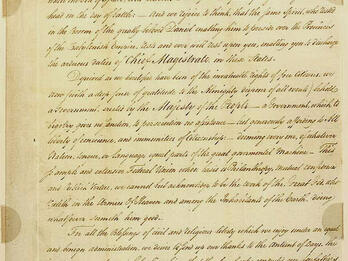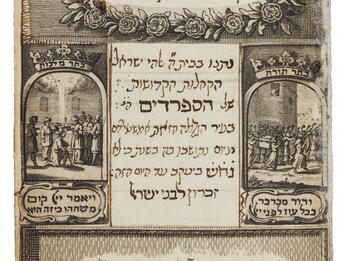History of the Colony of Suriname
Sensitive Content
We will briefly mention several of his more important military expeditions. In the year 1731, Mr. Boeyé, Officer of the Christian Citizens Militia, received an order from the Council to carry out a military expedition against the Maroons,1 and Captain Nassy was charged with having a detachment of his Citizens ready to reinforce Boeyé in the event of fighting or apprehension. Nassy mobilized, accompanied by his Indians, according to the orders that he had received, and along the way he met Boeyé, who was retreating with all possible haste, because he had had the misfortune along the way of encountering by chance a group of fugitives who had killed one of his men. However much Nassy pleaded with him to continue on the campaign, insisting that he would meet up with the Maroons within two or three days and engage them, Boeyé would not listen to him and persisted in his refusal to join in. Nassy therefore took on the campaign for his own account, went to confront the enemy with his detachment, and had the good fortune to encounter them in their houses, to capture several of them, and to kill a considerable number of them. Meanwhile criminal charges were brought against Officer Boeyé on account of his dilatory behavior; yet he in turn accused Captain Nassy; as a result of which charges were brought against both of them by the public prosecutor; with the result that Boeyé was found guilty and was punished. The truth of this is evident in several eulogies and popular ballads that have been composed in Spain by a Jewish poet with the name Bien Venida del Monte, in honor of Captain Nassy.
In the year 1738 there was a rebellion on a plantation in Sarua belonging to the Jew Manuel Pereyra, in which the Negroes were for the most part from Kormantine, these being the most formidable of all these Africans, and they killed their master, as we have already mentioned above. Mr. Is. Arrias, former Commander of the Jewish Citizens Militia, who had two large residences close to the location where the rebellion had taken place, sent out a contingent of volunteer Citizens against them, under the command of two Subordinate Officers, Isaac Nassy and Abr. de Britto: Mr. Arrias provided this military expedition with everything that the detachment needed at his own expense, as well as sending along all the good Negroes that he had at his plantations. This campaign was so fortunate that the detachment that had been sent out, after being away for 6 months, during which time no one had received word concerning the fate of these volunteers, returned with 47 prisoners and 6 hands of those whom they had killed. The council, more than a little pleased with this outcome, paid out according to our archives 75 guilders to each Officer, 36 to each Citizen, each armed Negro 20, and each Negro porter 5 guilders; but the noble Mr. Arrias, whose plantations had suffered very greatly as a result of this campaign, received, as far as we know, not the least reward; he was not even thanked in writing by the council.
Mr. Hartsinck also recounts that a certain village of rebels, who are known by the name Creoles, as one commonly names those born in this country and who are the most formidable of all enemies, because of both their cunning and their skillfulness that they have attained through their association with the Whites since childhood, was attacked in the year 1731 by Captain Bley and was turned upside down; meanwhile it is known that this band of Negroes always went around committing every manner of hostilities against the Whites, and that this village first in the year 1743, in the time of Governor Mauricius, was destroyed to the extent that one no longer knew the village by the name that it carried before, and this as a result of the unflinching courage of Captain D. C. Nassy. Already an elderly man, he set out in the Harvest Month of the year mentioned, with 27 Civilians, 12 Soldiers, 15 Indians, 165 Negroes, and 60 Canoes (or boats made of hollowed-out trees) according to a plan that he had devised and presented to the council on the 10th of the Hay Month of 1743. After traveling up the Surinam River and having come upstream of various waterfalls that one encounters in navigating the river, he marched his detachment and attacked the enemies on the day of Kippur, or atonement of the Jews; and without any consideration of the holiness of that day, he pursued the enemies, set their cabins afire, destroyed the village, tore the roots of their staple crops out of the ground, took 14 captives, and killed very many villagers. The entire colony was very surprised by this campaign, yet the envy that had long been expressed with respect to the actions of this captain found support in some of the mistakes he had made, and teeth were sharpened against him, even though the outcome of his campaign had very greatly exceeded every expectation.2
The fact of the matter is: the orders of the captain were such that he was to march into the village of these Creoles, fight against them, destroy everything, and without delay to inform the council without leaving the place before receiving further orders; but instead of following these orders, his band, that included one of his brothers as well as one of his sons, having been told by the Indians and Negroes that the Maroons had poisoned the creeks and that in the present drought they would not be able to find water to drink, began to grumble so much that he found it necessary, against his will, to turn back with his prisoners and bring on his own the news of the victory he had achieved. Upon his arrival, which fell on the 14th of the Wine Month of the same year, his friends informed him of the mistake that he had made and furthermore that he must therefore prepare to defend his innocence, at least with plausible reasons, while his enemies and those envious of him were prepared to speak ill of him before the council; but, flattering himself that the fortunate outcome of a campaign that was considered well-nigh impossible would gain him some lenience with the council, he did not hesitate, several days after his arrival, to represent himself in the proceedings with all possible confidence. The council, and Governor Mauricius in particular, heaped a thousand accusations upon him, among these that he had appropriated the spoils that the Negroes belonging to the Christians had taken from the Maroons in order to give them to the Negroes of the Jews; and also that he had brought too many supplies into the forest and had wasted them; upon which he was ordered, without hearing his defense, to compensate the Negroes and several Indians for the detriment they had supposedly suffered; while steps were taken to further involve him in a criminal trial. This unexpected treatment, which brought about the collapse of the edifice of his glory, had such a frightful influence on the spirit of this good man that he contracted a strong fever that ended his days at the age of nearly 67 years. After his death, Mr. Is. Carilho was chosen as Captain in his place, according to his act of commission, signed in the Winter Month of that same year 1743.
Notes
[Maroons were descendants of African slaves and native Americans who formed bonds and rebelled against white plantation owners.—Ed.]
To find confirmation of all these things that one can read on p. 766 of Hartsinck, one can ask the Negroes of Juka, our new allies, about the truth of all this, and one will then find out that they have given two names to this village of the Creoles that was demolished by Nassy: Gri-Gri and Nassy-Broko. In the rural gibberish or Negro English, Gri-Gri means the sound that one makes when walking quickly over the ground with bare feet; Dem ron gri-gri is a way of saying when fleeing they ran very quickly. Nassy Broko means Nassy demolished it or tore it down, as Broko means nothing other than to demolish, to tear down, to smash up, to break into pieces, to destroy, etc.
Published in: The Posen Library of Jewish Culture and Civilization, vol. 6.




